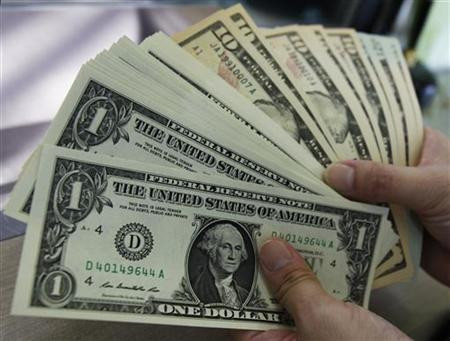Chinese Ask: Are We Seeing the Dollar's Decline as a Reserve Currency?

Unimpressed by U.S. deficit reduction efforts, the Chinese are raising more doubts about the dollar's supremacy.
Li Xiangyang, writing in the China People's Daily Aug. 8, said that the raising of the U.S. debt ceiling to $16.7 trillion has avoided a global financial crisis for the moment but is no long-term solution. It simply "removed the political restraint of debt default before the general election of 2012," he wrote.
Li points out that the pressure upon both Democrats and Republicans for a settlement was not simply internal but came from governments and international economic organizations from around the world, highlighting the fact that the U.S. dollar remains the leading international currency. Really the only one that matters, he could have added, and many times in his article, Li refers to America, or its politicians, ignoring and riding roughshod over the interests of international creditors.
Due to the U.S. dollar's position as the dominant world currency - some 50 percent of third-party world trade is settled in U.S. dollars - creditor nations, Li argues, "have no choice but to increase holdings of U.S. debt."
The attack continues: "Unlike the Southern European countries suffering from debt crises, the United States does not need tight economic policies or the financial support of international organizations and other countries, and the American people do not need to tighten their belts. As the issuer of a world currency, the Unites States has easily solved the debt crisis with an unreal 10-year commitment (to reduce the overall deficit by over $3 trillion). Therefore, the dollar-centered international monetary system in the post-crisis era must be reformed, not to mention that the United States was responsible for the global financial crisis."
Noting that the U.S. debt ceiling has now risen by more than $10 trillion in less than 10 years, Li acknowledges, with some caution, that the country could solve its deficit dilemma within a decade given strong economic growth, tax increases and spending cuts. If, however, it fails to do so and deficits continue to cause problems, possibly leading to more quantitative easing, then inflation and a depreciation of the dollar are likely to result.
Li notes that avoiding "double-dip" U.S. recession is in China's interest since the United States is China's most important export markets. The debt deal should also secure, for now, China's dollar assets "and keeps the exchange rate of the yuan (RMB) against the dollar stable."
Nevertheless, Li warns that ultimately, this is a short-term policy always susceptible to the fact that U.S. politicians "will ignore the interests of creditors for the needs of domestic political struggles" which could have catastrophic results for China, "much worse than at present."
In conclusion, Li advises: "It is undoubted that changing the existing pattern of intensively holding U.S. dollar assets is necessary. However, it is more important to change the trend of continuing to increase US dollar assets in the future, which requires fundamental adjustments in the economic development model."
I hate to be the bearer of bad news, but I can't find this $3 trillion deficit reduction, only the $2.1 trillion plan that President Barack Obama signed Aug. 2.
Was this article only for the eyes of China, which has currently $3.2 trillion in foreign reserve assets of which roughly $1 trillion is U.S. government paper? There is certainly a great deal in the article that is no doubt exercising the minds of the Chinese government's finance bureau and central bank, but I'm sure it's just part of a broader message.
Li's article came hot on the heels of America's downgrade by Standard and Poor from AAA to AA+, most likely due to the fact that S&P had been urging a deficit reduction starting point of $4 trillion.
Pulling no punches as usual, China lambasted the U.S. for "living beyond its means," demanded assurances regarding the safety of China's dollar assets and a serious attack on its structural debt problem.
Xinhua, China's official news agency said: "International supervision over the issue of U.S. dollars should be introduced and a new, stable and secured global reserve currency may also be an option to avert a catastrophe caused by any single currency."
For some time now, China has been edging away from the U.S. dollar, both in a reduction in the proportion of its foreign reserve holdings and in its willingness to settle its trading accounts in other currencies. Formal agreements have been made with Russia in November 2010 allowing the option of settlement in their respective currencies and this follows on a June 2009 agreement with Malaysia.
On Friday, the Standard Today in Manila quoted Indonesia's Vice Trade Minister, Mahendra Siregar:
"China and the ASEAN countries plan to promote the use of the yuan in regional trade to lessen the rise of currency volatility that may hurt exports."
Siregar told China's Commerce Minister, Chen Deming, that ASEAN exported more than $230 billion to China during 2010.
The Standard Today also reported that the People's Bank of China, China's central bank, indicated that it will expand the yuan's use in cross-border trade and investment and broaden the channels for yuan inflows and outflows.
Since May 2011, the paper noted, Japan and South Korea have also been studying regional currency trade settlement.
On Sunday, Gary Locke gave his first news conference in Beijing as the new U.S. ambassador to China. The Voice of America reported that he pledged to strengthen his country's bilateral ties with China in business, science and academia and said that "the United States is working to get its financial house in order."
TheaAmbassador went on to pledge that he would raise his country's concerns about China's human rights record. I'm sure that will go down like a lead balloon.
© Copyright IBTimes 2025. All rights reserved.




















